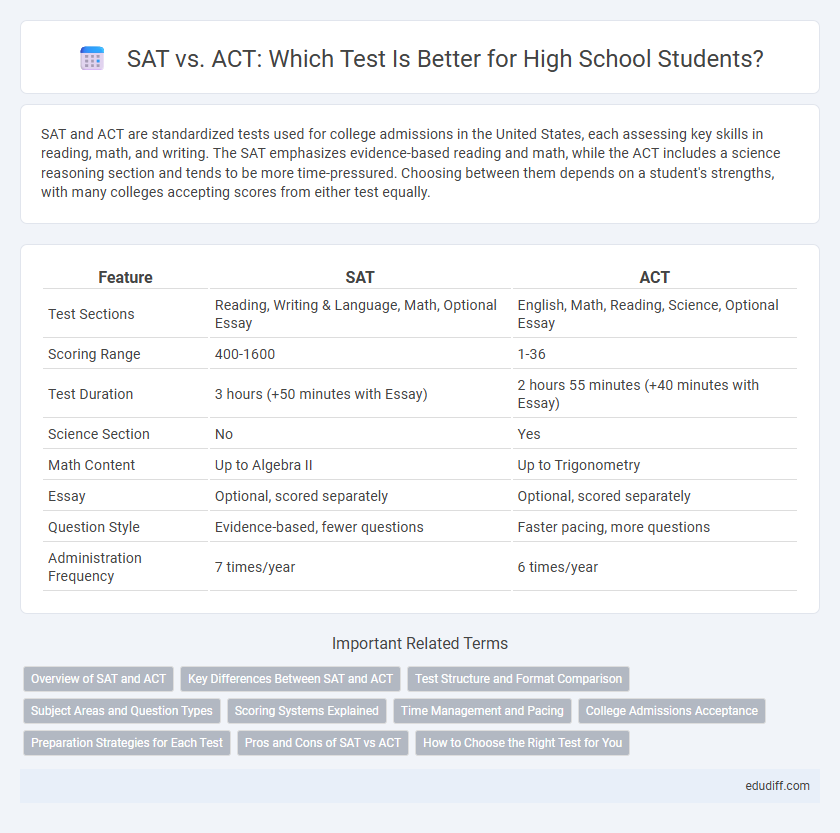SAT and ACT are standardized tests used for college admissions in the United States, each assessing key skills in reading, math, and writing. The SAT emphasizes evidence-based reading and math, while the ACT includes a science reasoning section and tends to be more time-pressured. Choosing between them depends on a student's strengths, with many colleges accepting scores from either test equally.
Table of Comparison
| Feature | SAT | ACT |
|---|---|---|
| Test Sections | Reading, Writing & Language, Math, Optional Essay | English, Math, Reading, Science, Optional Essay |
| Scoring Range | 400-1600 | 1-36 |
| Test Duration | 3 hours (+50 minutes with Essay) | 2 hours 55 minutes (+40 minutes with Essay) |
| Science Section | No | Yes |
| Math Content | Up to Algebra II | Up to Trigonometry |
| Essay | Optional, scored separately | Optional, scored separately |
| Question Style | Evidence-based, fewer questions | Faster pacing, more questions |
| Administration Frequency | 7 times/year | 6 times/year |
Overview of SAT and ACT
The SAT and ACT are standardized tests widely used for college admissions in the United States, assessing students' readiness for college-level work. The SAT emphasizes evidence-based reading, writing, and math skills with an optional essay, while the ACT includes English, math, reading, science reasoning, and an optional writing test. Both exams score students on a scale--SAT ranges from 400 to 1600, ACT from 1 to 36--with many colleges accepting either for admissions.
Key Differences Between SAT and ACT
The SAT emphasizes evidence-based reading, writing, and math, featuring an optional essay, while the ACT includes a science reasoning section and a mandatory essay for some colleges. The ACT tests faster pacing with four sections--English, math, reading, and science--compared to the SAT's focus on fewer, longer sections. Scoring differs as the SAT ranges from 400 to 1600, combining two main sections, whereas the ACT scores each section from 1 to 36 and averages for a composite score.
Test Structure and Format Comparison
The SAT consists of two main sections: Evidence-Based Reading and Writing, and Math, with an optional Essay, spanning 3 hours plus 50 minutes for the Essay. The ACT features four required sections: English, Math, Reading, and Science, lasting 2 hours and 55 minutes, with an optional 40-minute Writing test. SAT questions emphasize reasoning and problem-solving, while ACT questions focus on direct knowledge application and time management skills.
Subject Areas and Question Types
The SAT emphasizes evidence-based reading, writing, and math, with questions often requiring data interpretation and problem-solving skills across algebra, geometry, and basic trigonometry. The ACT covers a broader range of subjects, including English, math, reading, and a science section that tests critical thinking through charts and experiments. SAT questions tend to focus on analysis and reasoning within fewer subject areas, while ACT questions demand faster pacing and include science reasoning alongside more diverse math topics.
Scoring Systems Explained
The SAT scoring system ranges from 400 to 1600, combining two main sections: Evidence-Based Reading and Writing, and Math, each scored between 200 and 800. The ACT scores range from 1 to 36, averaging four test sections: English, Math, Reading, and Science, each scored individually. Both tests provide an optional Writing section that is scored separately and does not affect the composite ACT score or SAT total score.
Time Management and Pacing
Effective time management and pacing strategies differ significantly between the SAT and ACT exams, impacting overall test performance. The SAT allots 65 minutes for Reading and 35 minutes for Writing, requiring meticulous time allocation per passage to avoid rushing, while the ACT's Reading section allows 35 minutes for four passages, demanding quicker comprehension and decision-making. Math sections on both tests require swift problem-solving; however, the ACT's 60-minute math portion covers more questions than the SAT's 80-minute math section, necessitating a faster pace to complete accurately.
College Admissions Acceptance
SAT and ACT scores remain critical components in college admissions acceptance, with many institutions accepting both tests interchangeably. Research indicates a slight preference for SAT scores at highly selective universities, while regional differences influence ACT popularity, particularly in the Midwest and South. Understanding specific college requirements and submitting strong overall applications can enhance acceptance chances regardless of the test chosen.
Preparation Strategies for Each Test
Effective preparation strategies for the SAT emphasize targeted practice in evidence-based reading, math, and writing, with an emphasis on timed sections to build stamina. ACT preparation requires mastering subject-specific content areas like science reasoning alongside English, math, reading, and optional writing, with a focus on speed and accuracy due to the test's faster pace. Utilizing official practice tests from the College Board for the SAT and ACT, along with personalized study plans, enhances familiarity with test formats and question types.
Pros and Cons of SAT vs ACT
The SAT offers a stronger emphasis on evidence-based reading and math skills, making it favorable for students excelling in these areas, while its consistent structure can benefit test-takers who prefer predictable formats. The ACT includes a science reasoning section, appealing to students with strong analytical and scientific skills, though its faster pace may challenge slower readers. Both tests serve as standardized college admissions tools, so students should consider their strengths, time management skills, and college preferences when choosing between the SAT and ACT.
How to Choose the Right Test for You
Choosing between the SAT and ACT depends on your strengths: the SAT emphasizes evidence-based reading and math, while the ACT includes a science section and faster-paced questions. Analyze practice test results to identify which exam aligns better with your skills and timing preferences. Consider college requirements and whether the optional ACT Writing or SAT Essay fits your application strategy.
SAT vs ACT Infographic

 edudiff.com
edudiff.com